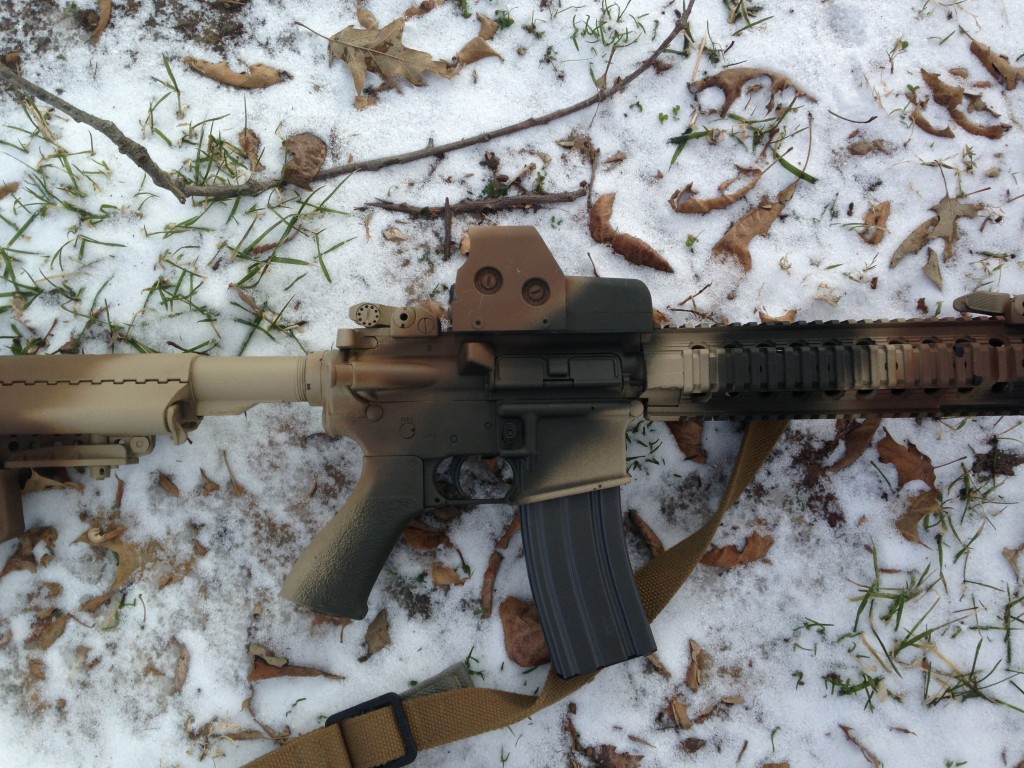When the mercury drops into the single digits and stays there, things you don’t normally see freeze will freeze. Fortunately for most of the United States, this is a rare occurrence, though this season seems to be the exception. For extreme cold conditions, we have to take special precautions to ensure that our equipment functions. Our friends in the Northern US, or elevation in the mountain regions simply call this “Tuesday-another day at the office”.
Some tips for keeping your AR running in the extreme cold-
- Use a synthetic lubricant. And then, use only a light coat.
- Ensure that all operating surfaces are lubricated, but not over lubricated.
- Clean your buffer tube and buffer spring. If you use a lubricant after cleaning, wipe off all excess.
- Keep the bolt as carbon free as possible. Carbon build up isn’t a determent to running an AR most of the time. Carbon provides a porous surface for freezing.
- Clean and wipe down all of your magazines.
- If your rifle gets exposed to moisture, even if it is condensation of going extreme cold to warm, clean it.
- Ensure that if it has a dust cover, it stays closed. Some people advocate leaving the dust cover open in extreme cold weather, but I think you are better off closing it.
- Keep spare batteries on hand for lights and sights. Severe cold weather sucks the life out of batteries.
These are just a few tips to keep your AR healthy in times of extreme cold weather. Feel free to share you favorite tips in the comments.




Thanks for the timely article – this morning on my way to work it was -6 out there. It’s crazy how fast batteries die when it’s this cold.
Going from single digits to warm shelter wait about one hour before cleaning its takes about that long for condensation process to stop.
I would imagine that most, if not all, modern synthetic lubricants are rated for extremely low temperatures, but it doesn’t hurt to check.
+1 on the timelyness of this, was 13f this morning and will be colder tomorrow here in N. Ga. Lube, batteries and condensation are the big concerns for sure and we take them for granted most of the time down here. Everyday materials and items will behave differently in the cold, bungee cords for example cease to bungee at around 9f in my experiance. Some folks may learn a new term-freeze plugs-as antifreeze is not a huge seller here.
Tape up the muzzle and the drain hole in the receiver extension/buffer tube. It doesn’t matter if you’re living outside or carrying the rifle in a patrol car you don’t want snow getting in there. It just takes one drop into a snow bank when you’re removing it from your car and now your weapon is down.
Good comments about freezing. It’s also important to remember that combustion produces water vapor. Any place on an AR that gets carbon deposits will also receive water vapor via the gas system. If your AR has been fired outdoors in extremely cold weather, clean it.
Keep it clean! It doesn’t have to be “boot camp,” just keep the gunk off it, especially BCG, and then lube it. Any reputable synthetic will work. I have used Slip 2000 and not had any problems. Those who just HAVE to have their AR, but don’t clean it and leave it exposed to extreme cold should not be surprised to hear a click instead of a bang, or that they can’t even pull back the charging handle. Gunk is the real enemy in any climate.
Cold or hot out, try some Randclp oil, you will like it, trust me.
Robert White. W.T.D.
After having some days in Oregon where the temp in the morning was 4 F, I put my Rand CLP in the freezer to see what would happen. It froze into a solid mass that would not flow no matter what. In that cold of weather I am going to use something else.
Keep your spare batteries close to your body or other heat source. If you have to be in the cold for an extended period of time switch back and forth between warm and cold batteries. One of the chemical hand warmers will keep them toasty also. Funny, same goes for butane lighters! (Bic, Cricket,etc.)